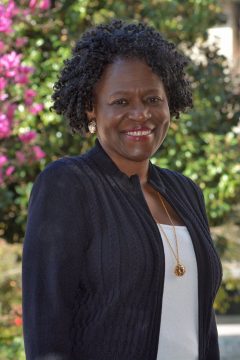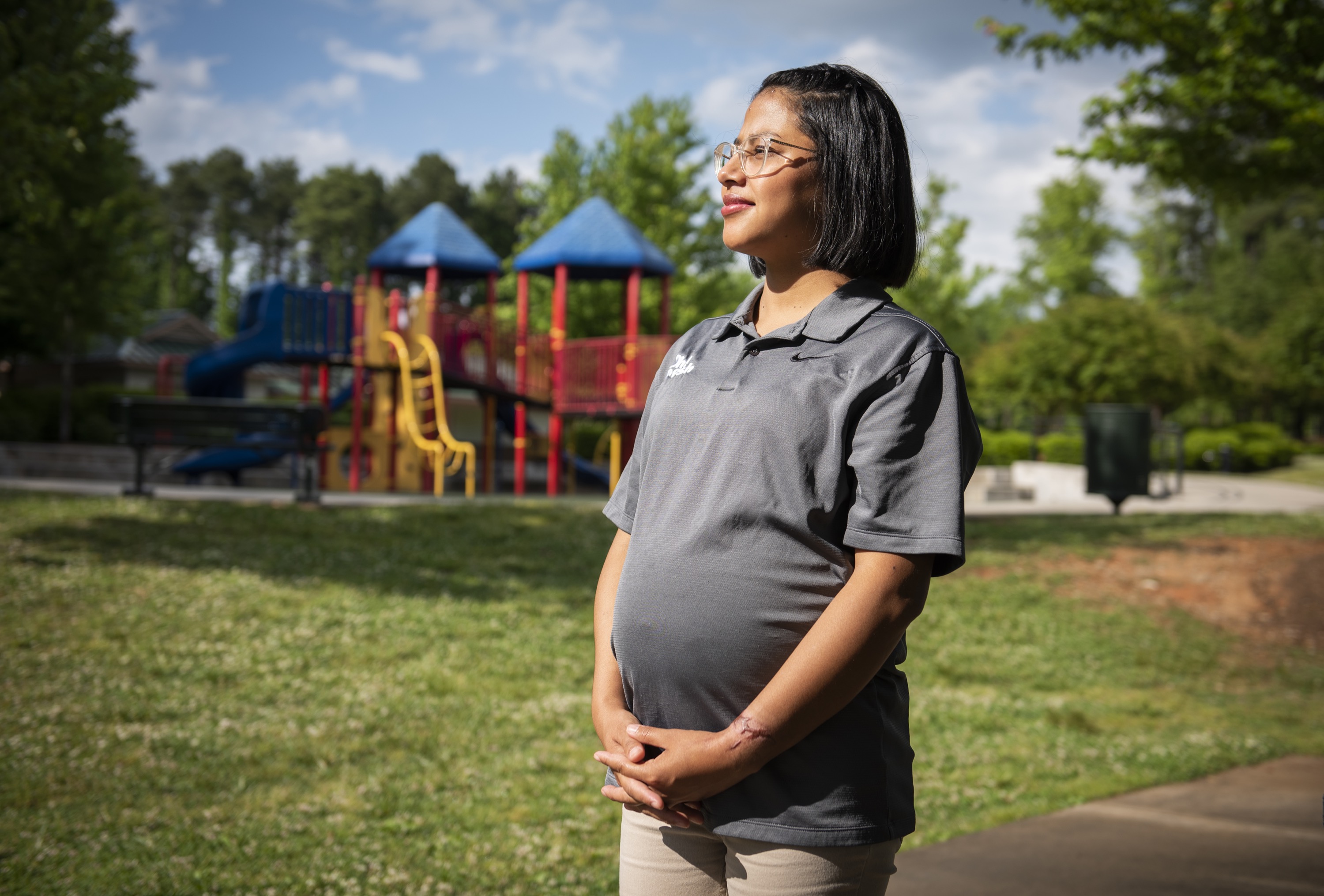Funded by the North Carolina Governor’s Crime Commission, Elon Law’s Emergency Legal Services Program plays a key role in helping those who turn to family justice centers for protection from abuse in Guilford and Alamance counties.
Physical blowups with her partner had become routine around the home, but for Maricruz Hernandez-Valdez, the breaking point was when he got drunk one day in 2018 and assaulted their 11-year-old daughter. That was when Hernandez-Valdez realized she needed help.
The mother of four already was familiar with the Guilford County Family Justice Center in downtown Greensboro, North Carolina, and had previously visited for guidance on the relationship. Now that her partner had turned his ire on a child, guidance wasn’t enough. She sought a restraining order.
“I was looking for protection,” Hernandez-Valdez says. “I knew I wasn’t going to be able to get the kind of support I needed from my family. More than anything, this was to let him know that I wasn’t alone and someone was going to help me.”
The Guilford County Family Justice Center and the almost identical Alamance County Family Justice Center on Martin Street in nearby Burlington offer comprehensive resources for victims of domestic violence, sexual assault, child abuse and elder abuse. Both centers bring together under one roof law enforcement, medical, legal and social service professionals to coordinate access to services, safety planning and judicial intervention with a special focus on victims of domestic and sexual violence.
Among the agencies that contribute to the success of both centers is Elon Law’s Emergency Legal Services Program, a one-of-a-kind program in American legal education. The program aids clients in emergency situations by providing in-house legal consultations, help with preparing and obtaining domestic violence protective orders, and coordination with other in-house professionals about criminal charges and other comprehensive services designed to get clients to safety.

Statistics shared by the National Coalition Against Domestic Violence indicate that domestic violence is “prevalent in every community and affects all people regardless of age, socioeconomic status, sexual orientation, gender, race, religion, or nationality.” More than 10 million adults experience domestic violence each year. An estimated 20 percent of all female victims and 11 percent of male victims are in need of legal services. Nationally, nearly a quarter of all women experience intimate-partner physical violence during their lifetimes. In North Carolina, that number is 44 percent, and the problem has only intensified over the past year with the COVID-19 pandemic and related government-issued lockdowns.
“Issues of domestic violence and intimate-partner violence breed in isolation,” says Catherine Johnson, director of the Guilford County Family Justice Center. “While in the past year and a half we’ve had to take necessary steps to self-isolate for health, what we know is that instances of physical abuse and financial abuse have intensified.”
Funded by the North Carolina Governor’s Crime Commission with grants totaling more than $2.5 million, the Elon Law program provides specialized legal services in the fields of family law, immigration and elder abuse to ensure a victim’s immediate physical and psychological health and safety. It often refers its clients to Child Protective Services or other social service agencies. When appropriate, the attorneys — some part-time, some on contract — help clients with child custody agreements or modifications to existing arrangements.
“People that come to the Family Justice Center have been living in abusive situations for a while, and for whatever reason, they have gotten to a point where they have decided to reach out for help” says Margaret Dudley, director of Elon Law’s Emergency Legal Services Program. “You’d be surprised what people will tell you about their lives.”
Dudley has been with the Elon Law legal services program since it joined the Guilford and Alamance centers in 2017. A longtime Greensboro attorney — Dudley was the third Black woman to practice law in Guilford County — she manages a team of part-time and contract attorneys, Elon Law students on externships and in their residencies-in-practice, and an administrative assistant. It was a career opportunity that took time to consider. After years of managing her solo law practice, and inspired by experiences growing up in Eastern North Carolina and other parts of the Jim Crow South, Dudley saw how her no-nonsense approach and decades of courtroom litigation could be of value in helping people in crisis find a measure of peace.
“Attorney Dudley is a really strong woman,” Hernandez-Valdez says recounting consultations about how legal documents are written and how arguments are presented in court. “At first I was a little bit intimidated! But I also saw myself in her. When she told me, ‘This is how it needs to be and this is how it goes,’ I just knew this was who I needed. Being strong isn’t a bad thing.”
Neither Dudley nor Johnson is aware of another law school that offers emergency legal services inside a family justice center in the same manner as Elon Law, though Johnson says some law schools operate domestic violence clinics that may assist nearby centers.
The impact of Elon Law’s innovative approach led last year to an invitation for Dudley to co-teach a national webinar for civil attorneys on how to try cases involving strangulation. The webinar was co-hosted by the Alliance for Hope International’s Strangulation Institute and the American Bar Association.
People that come to the Family Justice Center have been living in abusive situations for a while, and for whatever reason, they have gotten to a point where they have decided to reach out for help. —Margaret Dudley
An integral part of Elon Law’s program is the student component. Dudley and her team welcome several students each year for academic credit as part of their residencies-in-practice or externships. Katherine Bordwine L’18, an attorney with Legal Aid of North Carolina, praised Dudley’s mentorship and the lessons she shared for achieving success in the profession.
“She taught me that empathy without boundaries really isn’t the way to go in providing legal services,” says Bordwine, who completed her Elon Law residency-in-practice inside the Guilford County Family Justice Center. “It’s better to have compassion for someone in crisis and help them build a plan for addressing what’s happening in their lives. When you understand where people are coming from, really amazing things can happen, whether it’s getting out of a situation or persevering through a difficult situation.”
Ultimately, that’s how Hernandez-Valdez found the help she needed. A temporary restraining order, followed by a modified custody agreement that gave her now-former partner time to rebuild trust with his children, has led to a healthier situation for everyone. “For me, it’s always about my children. It wasn’t about me and him. Punishment wasn’t the goal,” Hernandez-Valdez says. “I wanted to find stability in my children’s lives. I wanted them to be safe.”



